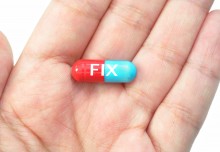Learn the Signs & Symptoms of Binge Eating Disorder (BED)
Binge eating disorder (BED) is an eating disorder characterized by recurrent episodes of eating large quantities of food (often quickly and to the point of discomfort); feeling a loss of control during a binge; and feelings of shame, distress or guilt. It is a severe, potentially life-threatening and treatable eating disorder.
Binge eating disorder affects people of all demographics. Presently, it is the most common eating disorder in the United States. It affects 3.5% of women, 2% of men and up to 1.6% of adolescents, according to the National Eating Disorders Association. In women, it is most common in early adulthood, and in men, it is more common in midlife.
Some common signs and symptoms of binge eating disorder
• Eating an unusually large amount of food within a short period of time, such as over an hour or two.
• Eating alone or in secret on a regular basis.
• Feeling disgusted, upset, ashamed, guilty or depressed about your eating behavior or habits.
• Feeling like you are out of control when eating.
• Eating for reasons other than hunger, eating when you’re not hungry or are already feeling full.
Not to be confused with bulimia, binge eating is a different condition. Bulimics, after a binge or even just a small amount of food consumed, will compensate for extra calories eaten by vomiting, exercising excessively or using laxatives.Weight gain may or may not be associated with binge eating disorder. It is important to note that while there is a correlation between the particular disorder and weight gain, not everyone who is overweight binges or has binge eating disorder.The severity of a binge eating disorder is determined by how often one binges during a week. It is common for binge-eaters to try to diet or eat normal. Restricting a binge-eaters diet often leads to more binges.Binge eating is a serious condition that requires medical help to address. If you are concerned about possible binge eating or other harmful food-related behaviors, seek advice from a medical doctor as soon as possible.
Who is at greatest risk of developing a binge eating disorder?
Anyone can suffer from a binge eating disorder, but here’s a list of some common factors that can make the condition more likely.
AGE
Most commonly begin in the late teens and early 20s, but it can occur in people of any age.
DIETING
Dieting or calorie restriction can often trigger urges to binge. People with low self-esteem, depression or poor self-image are more likely to regularly diet and binge. Often people with binge eating disorder have a history or dieting that can stem back to childhood.
PSYCHOLOGICAL ISSUES
People who suffer from binge eating disorders often struggle with a poor self-image and negative thoughts about themselves. Stress, boredom, poor self-image and even food can act as a trigger for binge eaters. Psychiatric disorders often linked with binge eating disorder include depression, bipolar disorder, and anxiety.
FAMILY HISTORY
Eating disorders are more likely among individuals who have family members who also suffer from an eating disorder.
Common Problems
• Obesity
• Social
• Difficulty functioning in social situations, at work or in relationships
• Unhappiness, depression
• Poor outlook and quality of life
• Poor self-image
• Health conditions resulting for excess eating and obesity – Type 2 diabetes, GI problems, heart disease, reflux, troubles sleeping
Warning Signs
• Recurrent episodes of eating an abnormally large amount of food during a period of time
• Feeling a lack of control during a binge
• Not being able to stop eating
• Consuming an excessively large amount of food
• Binge eating that’s associated with at least three of these factors: eating rapidly; eating until uncomfortably full; eating large amounts when not hungry; eating alone out of embarrassment; or feeling shame or disgusted, depressed or guilty after eating.
• Feeling concerned about binge eating behavior
• Binge eating that is not associated with purging, such as self-induced vomiting or other compensating behaviors to lose weight, such as excessive exercise or laxative use.
• Evidence of binge eating, including the disappearance of large amounts of food in short periods of time or lots of empty wrappers and containers indicating consumption of large amounts of food.
• Secretive food behaviors, including eating secretly (e.g., eating alone or in the car, hiding wrappers) and stealing, hiding, or hoarding food.
• Disruption in normal eating behaviors, including eating throughout the day with no planned mealtimes; skipping meals or taking small portions of food at regular meals; engaging in sporadic fasting or repetitive dieting; and developing food rituals (e.g., eating only a particular food or food group [e.g., condiments], excessive chewing, not allowing foods to touch).
• Creating lifestyle schedules or rituals to make time for binge sessions.
• Can involve extreme restriction and rigidity with food and periodic dieting and/or fasting.
Seeking Help for Binge Eating Disorder in Rockville and Bethesda, Maryland
If you or a loved one may be exhibiting signs of binge eating disorder, it is important to seek professional medical help. This is not a condition that is successfully treated without professional help. Start by contacting your personal physician to discuss your symptoms and concerns.
Source: American Psychiatric Association and Mayo Clinic and National Binge Eating Association.
DISCLAIMER NOTICE: Information is deemed accurate, but not guaranteed. Mybodytech.com and BodyTech Weight Loss and Health clinic and it’s staff, affiliates, associates, agents, vendors, and contractors do not offer medical advice and should not be considered medical experts. Information provided on this website is not intended to be used for the diagnosis, treatment or any sort of medical help. The information found on this website should never replace that of your personal medical advisors.






